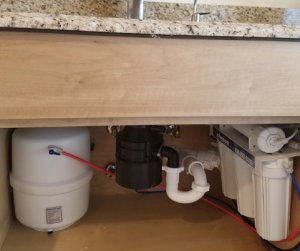Should You Install a Reverse Osmosis System? Advice from an Oswego Water Softening Company
 There are a number of different water conditioning systems available on the market today, each of which serves a different function. When it comes to having clean, smooth drinking water, no system bests the reverse osmosis system.
There are a number of different water conditioning systems available on the market today, each of which serves a different function. When it comes to having clean, smooth drinking water, no system bests the reverse osmosis system.
Interested in learning more about the reverse osmosis system? Wondering whether it’s right for your home? Read below to find out for yourself.
Primary Characteristics of the Reverse Osmosis System
Reverse osmosis systems share some similarities with other water conditioning systems. However, by and large, they are quite different. We’ll review the primary characteristics of the reverse osmosis system below.
Removes the Vast Majority of Contaminants from Water
Every water conditioning system serves a function. Water softeners remove calcium and magnesium from water. Chlorine injection systems neutralize iron, manganese, hydrogen sulfide, and bacteria. What does the reverse osmosis system do? All of this!
The reverse osmosis system removes almost all contaminants from water, making it as clean and as drinkable as technology allows. Some of the contaminants that it removes include lead, arsenic, iron, and coliform bacteria, to name just a few.
On the Smaller Side
Whereas water softeners are fairly large entities that take up sizable amounts of space, reverse osmosis systems are on the smaller side. Oftentimes, they’ll fit directly under sinks, ensuring that they take up minimal amounts of space.
Affordable to Operate
Reverse osmosis systems operate on water pressure alone. As long as they’re hooked up to a water supply, they will perform their function as needed.
As such, they’re very affordable to run. They use no electricity whatsoever, and therefore, they have no impact on their users’ energy bills.
Low Maintenance
Though they do require some maintenance, reverse osmosis systems are fairly self-reliant machines. Generally speaking, all they require are filter changes from time to time (every 6 months or so).
What are the Limitations of the Reverse Osmosis System?
Reverse osmosis systems can be highly beneficial. That said, they have some limitations. We’ll review them below.
Cannot Handle Large Volumes of Water
One of the main limitations of reverse osmosis systems is that they can’t handle large amounts of water. For every gallon of pure water that these systems produce, they waste even more. As such, they’re really only designed for drinking water purposes.
If you’re looking to purify your water for showers, cleaning, and other activities, you’ll have to go with something a little more efficient. A water softener will suffice in most situations. Note, though, that if you use well water, you might want to install a chemical injection system or an iron filtration system as well.
Removes Some Vital Minerals
The truth of the matter is that some of the minerals in water can actually be beneficial. For instance, iron, manganese, and calcium are all vital parts of the human diet.
Unfortunately, reverse osmosis systems remove these minerals, which means your water has no nutritional benefit. It’s important to note, though, that these minerals are available in a variety of other foods (not to mention supplements). As such, if you decide to install a reverse osmosis system in your home, you shouldn’t have much trouble finding your vital minerals elsewhere.
Looking to Install a Reverse Osmosis System in Oswego?
Is a reverse osmosis system right for you? Looking to install a reverse osmosis system in Oswego, specifically? If so, Johnson Water Conditioning is the company to call.
We’ve installed reverse osmosis systems in countless homes in Oswego, Illinois. Regardless of the size of your water supply, we can accommodate you.
Contact us today to get started!

 Better Water for
a Better Life
Better Water for
a Better Life
